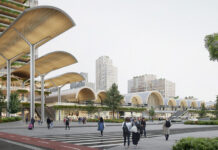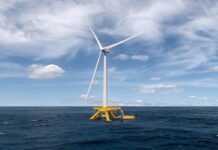[ad_1]

Two funerals taking place side by side one afternoon along the banks of a slick-black river of oil is a stark reminder of the deadly impact pollution is having on this slice of northeast Syria.
Light-headed from the choking fumes, the mourners stretch out under two tents in Kharab Abu Ghalib village, which like many places in the country was once blessed with green pastures but is now stained blackish-brown from oil leaks.
Across this tyranny of sludge, the only flash of colour is from the river itself: where the sun licks the oiled surface into intermittent kaleidoscopes.
And it is this waterway – devastated by a 2020 oil spill from a major storage facility nearby – that the locals blame for the surge in deaths in the area. It is a claim echoed across villages in northern Syria that have also been hit by the growing problem of pollution.
In just a four day period prior to our visit, an elderly man and a middle-aged woman died after suffering breathing difficulties, chest problems and kidney failure. Ayman, the nephew of one of the deceased, said 10 people in this village have died in the last year, which is an unusually high number. Livestock has also perished and farmlands become barren.
“We don’t know exactly what they died from, but we know it’s related to this pollution which makes our lungs and our immune systems weak,” the young man explains standing by the toxic river.
“We can’t sleep at night because of the smell. We are worried as it makes us more vulnerable to coronavirus.”
This village is located near the Rumelian oil field and 10km downstream from Gir Zero, the main oil storage facility in northeast Syria that is on territory controlled by the Kurdish-led administration. It is one of many villages across the country that has been devastated by pollution from the oil industry that is the main resource keeping this battle-ravaged state afloat, while simultaneously killing it.
Across the landscape, pumping jacks like worshippers in a trance, bow to the ground with unrelenting and unnerving regularity. They crowd out towards the skyline which at night is perforated by the towering stacks of gas flares that burn unnaturally brightly.
Interspersed are hundreds of makeshift oil refineries where ashen-face workers move through hazes of toxic waste. The air stings. Lungs burn. Breathing is difficult.
It is one legacy of 10 years of war in Syria that has left a heavy toll on the country beyond the bombed-out rubble.
In the country’s northeast, fighters and warplanes have overrun or intentionally targeted oil facilities, damaging storage tanks, pipelines, and machinery.
When Isis took over much of the area in 2014, they cobbled together the broken parts to draw out oil and fund the caliphate. And so both oil fields and refineries were targets during the US-led coalition’s war to crush the jihadi group.
The conflict has subsequently decimated oil production, which before the war was around 400,000 barrels a day and now is estimated to have sunk to between 20,000 and 30,000, according to industry experts.
An unrelenting economic crisis, ongoing fighting, and lack of investment (often because of concerns about sanctions on Syria) has meant there has been little reconstruction or maintenance for the few facilities still working, leading to inevitable oil leaks and rampant dumping of oil waste.
The destruction of official oil refineries and the pipeline to the main refinery located in Homs has also seen thousands of makeshift refineries spring up, each spewing waste including heavy metals that are known human carcinogens like mercury, lead and arsenic, into the ground.
Gases, like sulphur dioxide and nitrogen oxide, by-products of oil production and refining, are burned or released into the atmosphere.
The oil-choked river at Kharab Abu Ghalib village where villagers say people are dying
(Bel Trew)
All of this has been made worse by an unprecedented drought in Syria this year, as the punishingly low water levels have meant there isn’t enough water to dilute and flush the pollution downriver.
“The oil industry is both the driving force of the environment and killing it at the same time because of the air and ground pollution,“ says Wim Zwijnenburg from Dutch Peace organisation Pax, who wrote a July report warning of the accumulative impact of oil pollution on the north-east.
“That has only been complicated by the arrival of the pandemic in an unprecedented year of drought as the oil spills have made it even harder for villages downstream of facilities to get access to clean water needed to fight the virus. “
The Independent repeatedly reached out to the Kurdish-led administration to ask about the informal oil refineries and about how they were tackling the pollution issue in general. Officials acknowledged the problem but declined to comment on ways they were addressing it.
Experts on the oil industry say the authorities and people running the oil facilities lack the finances, resources and support to take on such a complex problem and that they need international help.
In the interim villages like Kharab Abu Ghalib have been left broiling in the toxic wasteland.
Locals say there were efforts prior to the civil war to address the oil pollution issue which has long blighted this area, but the fight between regime soldiers and rebel fighters in the early years of the war followed by Isis’s take-over in 2014, resulted in the destruction of specialised pumps treating oil waste.
According to an investigation by Pax, there have since been several mass spills and oil floods over the years including in 2020. Then poor maintenance of the Gir Zero facility saw its pipes explode polluting more than 18,000 m2 of land including neighbouring canals, creeks and the 160km river that runs through Kharab Abu Ghalib.
The combined soil, water and air pollution has meant entire harvests and crop fields in the area have been lost, it has killed rivers, and poisoned the air which locals say has seen a surge in cancer cases, chest infections and internal organs failure.
“Our women are worried about the rise of birth defects in children. People have chest problems, there are four people in this neighbourhood who have cancer and have had to travel to Damascus as there is no oncology unit in the region,” says Mohamed Hussein, 67 whose entire family lives in Kharab Abu Ghalib.
Mohammed Hussein says livestock and farmland have been destroyed by oil pollution
(Bel Trew)
“We have no immune system against any kind of disease, not just the coronavirus. Even the groundwater is now toxic.”
He said it is destroying livelihoods as most people are livestock and agricultural farmers.
Hussein’s cousin Mahmoud Nasser 70, tried to wash 10 of his sheep in the river a few months ago as they were suffering from a skin disease. Each died within hours of exposure to the water, he says.
“The sheep were worth about $1000, that’s an entire year’s worth of money,” the elderly shepherd adds. “I just lost everything.”
Environmental scientists in the West spend years studying potentially hazardous industrial sites to determine whether they are the cause of disease clusters, with the cases often being adjudicated in courtrooms. And so althought it is difficult to directly attribute specific instances of pollution to individual cases of cancer or other diseases, local Syrian oncologists tell The Independent it is weakening immune systems in the middle of a pandemic in an area of the country where there are no cancer hospitals and no official international aid crossing to bring in much needed medical supplies.
“Over the last few years the number of cancer cases has doubled,” says Dr Dannish Ibrahim from his packed clinic in Qamishli, a nearby town along the border with Turkey.
He explains that he was the second oncologist in northeast Syria in 2017 but now there are four, and all of them are dealing with thousands of cases. “We see a correlation between the oil refineries, the oil waste in rivers, the car exhausts and the surge in cancer cases which are concentrated in areas around the oil fields.”
“It also plays a great role in weakening the immune system, we worry it makes more people vulnerable to the coronavirus.”
Over the last few years the number of cancer cases has doubled
Dr Ibrahim, an Oncologist in northeast Syria
This is keenly felt in the makeshift refineries, where the workers rely on painkillers to get through the day.
There, open lakes of oil waste, some partially on fire, bake in the sun, sending a wall of poisonous air over the torched landscape.
People, wrapped in scarves to ward off the worst of the toxic fumes, stand bent double over their cauldrons which are producing petrol, a low-quality diesel for generators and a substitute for cooking gas which is now in short supply.
At the height of this cottage industry when Isis held the territory between 2013 and 2017 there were as many as 30,000 of these roadside burners and makeshift refineries operating across northern Syria, according to Pax’s estimates.
There are now at 300 still operating in this corner of the country, creating products that are used locally but also sent to regime-held areas and territory controlled by opposition groups.
In addition to toxic substances, the workers are exposed to a slew of deadly hazards including exploding oil barrels. Workers at one refinery near Qamishli, say many also suffer from serious respiratory problems but they have no choice.
“Hunger is more terrifying for us than cancer,” says Ahmed, 40, a father of four standing by a burning heap of oil waste, silver-backed like thickened mercury.
Workers at makeshift oil refineries risk their lives to earn less than £8.80 a day
(Bel Trew)
He says the drought, pollution and economic collapse had made relying on farming impossible and so working at an oil refinery is the only way to survive. The team of 10 workers earn between £4.80 to £8.80 a day depending on their role. This is good money in a region where bread prices have more than doubled over the last year.
“One of these refineries supports 30 families. If you stop this refinery tomorrow 30 families will starve or turn to crime,” he adds.
His friend, whose face is stained with smoke from the lake of burning waste behind him, chimes in.
“Thinking about your health is a luxury,” he says.
“We have to think about surviving.”
The owner of this refinery, who runs a further four in the vicinity, tells The Independent his family started the business in 2012, the second year of the civil war when battles between regime soldiers and rebels destroyed the official refineries and the main pipelines.
He admits it pollutes the environment but says there is nothing else they can do.
“The main reason we started this work was because of necessity because there was no fuel, diesel or cooking gas,” he says declining to give his name.
“There is no future here – this is our future: you will die because of starvation or because of pollution.”
This is our future: you will die because of starvation or because of pollution
An owner of a makeshift oil refinery
Rights groups monitoring the crisis say the future is even bleaker as there is no solution to Syria’s conflict.
Zwijnenburg says few countries would risk pouring money into northern Syria to fix the oil infrastructure given the ongoing political instability and the threat of being caught up in US sanctions on the Syrian regime. Bashar al-Assad’s Damascus administration still claims the oilfields as their own, even if they are effectively controlled by the Kurds.
A brief attempt to process local oil in the northeast via a western company last year failed before it properly started. Delta Crescent Energy – which was set up by three American entrepreneurs including the former US ambassador to Denmark – managed to secure a rare US sanctions waiver from former president Donald Trump in March 2020. President Biden did not renew the waiver this year and the project apparently folded.
Adding to the pressure is the perceived threat of Turkey in northern Syria.
Turkey sees the Kurdish-led forces in the region as being linked to the Kurdistan Workers Party, which is considered a terrorist organisation by Turkey, the United States and the European Union. Over the last several years, Ankara launched numerous cross border incursions into Kurdish-held territory in Syria, occupying several border towns.
While a shaky ceasefire is in place, tensions have flared over the last year and there are fears of another conflict in the northeast while the Syrian civil war continues to rage in the northwest.
“No international donor is going to put long-term funding into this area to fix the economic infrastructure. All the money goes into stock gap measures,” Zwijnenburg tells The Independent.
Green fields have turned to wastelands due to oil spills
(Bel Trew)
But this has to change. He says that the only way to address rampant pollution and the linked socio-economic problems is if all relevant actors in the region come to a political solution that brings stability and opens up the region for long-term investment.
Without this, he says there is no positive future in sight and no way to make the area liveable again.
And so for now, the inhabitants of Khalid Abu Ghalib say they must live around the pollution as there are no other options.
“People ask us why don’t we leave? But where would we go?” All the villages along this river suffer from the same issue,” Hussein says walking slowly back from the fetid waterway to the funerary tent.
“This area used to be green to be covered in wheat,” he adds with a pause.
“And now it is hell.”
[ad_2]
Source link














